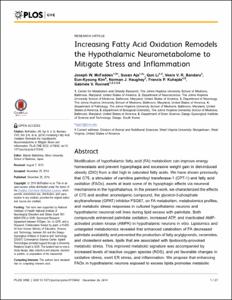Department of Brain Sciences
Lab of Neuro-Metabolism & Neurometabolomic Research Center
1. Journal Articles
Full metadata record
| DC Field | Value | Language |
|---|---|---|
| dc.contributor.author | McFadden, Joseph W. | - |
| dc.contributor.author | Aja, Susan | - |
| dc.contributor.author | Li, Qun | - |
| dc.contributor.author | Bandaru, Veera V. R. | - |
| dc.contributor.author | Kim, Eun Kyoung | - |
| dc.contributor.author | Haughey, Norman J. | - |
| dc.contributor.author | Kuhajda, Francis P. | - |
| dc.contributor.author | Ronnett, Gabriele V. | - |
| dc.date.available | 2017-07-11T06:13:38Z | - |
| dc.date.created | 2017-04-10 | - |
| dc.date.issued | 2014-12 | - |
| dc.identifier.issn | 1932-6203 | - |
| dc.identifier.uri | http://hdl.handle.net/20.500.11750/2986 | - |
| dc.description.abstract | Modification of hypothalamic fatty acid (FA) metabolism can improve energy homeostasis and prevent hyperphagia and excessive weight gain in diet-induced obesity (DIO) from a diet high in saturated fatty acids. We have shown previously that C75, a stimulator of carnitine palmitoyl transferase-1 (CPT-1) and fatty acid oxidation (FAOx), exerts at least some of its hypophagic effects via neuronal mechanisms in the hypothalamus. In the present work, we characterized the effects of C75 and another anorexigenic compound, the glycerol-3-phosphate acyltransferase (GPAT) inhibitor FSG67, on FA metabolism, metabolomics profiles, and metabolic stress responses in cultured hypothalamic neurons and hypothalamic neuronal cell lines during lipid excess with palmitate. Both compounds enhanced palmitate oxidation, increased ATP, and inactivated AMP-activated protein kinase (AMPK) in hypothalamic neurons in vitro. Lipidomics and untargeted metabolomics revealed that enhanced catabolism of FA decreased palmitate availability and prevented the production of fatty acylglycerols, ceramides, and cholesterol esters, lipids that are associated with lipotoxicity-provoked metabolic stress. This improved metabolic signature was accompanied by increased levels of reactive oxygen species (ROS), and yet favorable changes in oxidative stress, overt ER stress, and inflammation. We propose that enhancing FAOx in hypothalamic neurons exposed to excess lipids promotes metabolic remodeling that reduces local inflammatory and cell stress responses. This shift would restore mitochondrial function such that increased FAOx can produce hypothalamic neuronal ATP and lead to decreased food intake and body weight to improve systemic metabolism. © 2014 McFadden et al. | - |
| dc.language | English | - |
| dc.publisher | Public Library of Science | - |
| dc.title | Increasing Fatty Acid Oxidation Remodels the Hypothalamic Neurometabolome to Mitigate Stress and Inflammation | - |
| dc.type | Article | - |
| dc.identifier.doi | 10.1371/journal.pone.0115642 | - |
| dc.identifier.scopusid | 2-s2.0-84919934511 | - |
| dc.identifier.bibliographicCitation | PLoS ONE, v.9, no.12 | - |
| dc.description.isOpenAccess | TRUE | - |
| dc.subject.keywordPlus | ENDOPLASMIC-RETICULUM STRESS | - |
| dc.subject.keywordPlus | ACTIVATED PROTEIN-KINASE | - |
| dc.subject.keywordPlus | DIET-INDUCED OBESITY | - |
| dc.subject.keywordPlus | CARNITINE PALMITOYLTRANSFERASE-I | - |
| dc.subject.keywordPlus | REGULATES FOOD-INTAKE | - |
| dc.subject.keywordPlus | INSULIN-RESISTANCE | - |
| dc.subject.keywordPlus | LIVER-DISEASE | - |
| dc.subject.keywordPlus | MITOCHONDRIAL DYSFUNCTION | - |
| dc.subject.keywordPlus | SYNTHASE INHIBITOR | - |
| dc.subject.keywordPlus | LIPID-ACCUMULATION | - |
| dc.citation.number | 12 | - |
| dc.citation.title | PLoS ONE | - |
| dc.citation.volume | 9 | - |
- Files in This Item:
-

10.1371_journal.pone.0115642.pdf
기타 데이터 / 1.63 MB / Adobe PDF download



